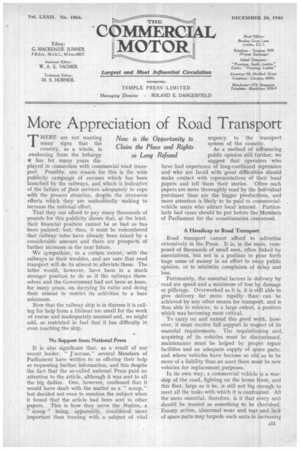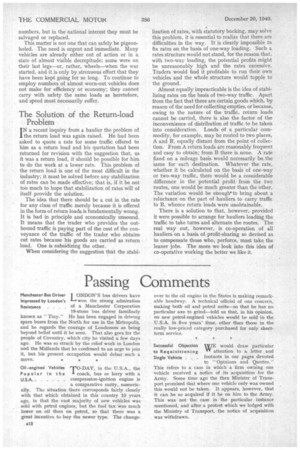More Appreciation of Road Transport
Page 13

Page 14

If you've noticed an error in this article please click here to report it so we can fix it.
THERE are not wanting many signs that the country, as a whole, is makening from the lethargy it has for many years displayed in connection with commercial road transport. Possibly, one reason for this is the wide publicity campaign of excuses which has been launched by the railways, and which is indicative' of the failure of their services 'adequately to cope . .
with the present situation, despite the strenuous efforts which they are undoubtedly making to increase the national effort. .
That they can afford to pay many thousands of pounds for this publicity shows that, at the leait, their financial position cannot be so bad as has been painted; but, then, it must be rethembered that railway rates have already been raised by a considerable amount and there are prospects of further increases in the near future.
We sympathize, to a certain extent, with the railways in their troubles, and are sure that road transport will do its utmost to alleviate these. The latter would, however, have been in a much stronger position to do so if the railways themselves and the Government had not been so keen, for many years, on decrying its value and doing their utmost to restrict its activities to a bare minimum.
Now that the railway ship is in distress it is callinc, for help from a lifeboat too small for the work of rescue and inadequately manned and, we might add, so restricted in fuel that it has difficulty in even reaching the ship.
No Support from National Press It is also significant that, as a result of our recent leader, " y accuse," several Members of Parliament have written to us offering their help or requesting further information, and this despite the fact that the so-called national Press paid no attention to the article, although it was sent to all the big dailies. One, however, confessed that it would have dealt with the matter as a " scoop," but decided not even to mention the subject when it found that the article had been sent to other papers. This is how they serve the Nation, a " scoop " being, apparently, considered more important than treating with a subject of vital urgency to the transport system of the country.
As a method of influencing public opinion still further, we suggest that operators who have had experience of long-continued repression and who are faced with great difficulties should make contact with representatives of their local papers and tell them their stories. Often such papers are more thoroughly read by the individual purchaser than are the bigger productions, and more attention is likely to be paid to commercialvehicle users who attract local interest. Particularly bad cases should be put before the Members of Parliament for the constituencies concerned.
A Handicap to Road Transport Road transport cannot afford to advertise extensively in the Press. It is, in the main, composed of thousands of small men, often linked by associations, but not in a position to pour forth huge sums of money in an effort to sway public opinion, or to minimize complaints of delay and loss.
Fortunately, the essential factors in delivery by road are speed and a minimum of loss by damage or pilferage. Overworked as it is, it is still able to give delivery far more rapidly than can be achieved by any other means for transport, and is thus able to retrieve, to a large extent, a position which was becoming most critical.
To carry on and extend this good work, however, it must receive full support in respect of its essential requirements. The requisitioning and, acquiring of its vehicles must be discontinued, maintenance must be helped by proper repair facilities and an adequate supply of spare parts, and where vehicles have become so old as to be • more of a liability than an asset there must be new vehicles for replacement purposes.
In its own way, a commercial vehicle is a warship of the road, fighting on the home front, and this fleet, large as it be, is still not big enough to meet all the tasks with which it is confronted. All the more essential, therefore, is it that every unit should be treated as something to be cherished. Enemy action, abnormal wear and tear and lack of spare parts may torpedo such units in increasing numbers, but in the national interest they must be salvaged or replaced.
This matter is not one that can safely be pigeonholed. The need is urgent and immediate. Many vehicles are already either out of action or in a• state of almost visible decrepitude: some were on their last legs—or, rather, wheels—when the war started, .and it is only by strenuous effort that they have been kept going for so long. To continue to employ numbers of almost worn-out vehicles does not make for efficiency or economy; they cannot carry with safety the same loads as heretofore, and speed must necessarily suffer.
• The Solution of the Return-load Problem
I N a recent inquiry from a haulier the problem of the return load was again raised. He had been asked to quote a rate for some traffic offered to him as a return load and his quotation had been returned for revision with the suggestion that, as it was a return load, it should be possible for him to do the work at a lower rate. This problem of the return load is one of the most difficult in the industry; it must be solved before any stabilization of rates can be made effective; that is, if it be not too much to hope that stabilization of rates will of itself provide the solution.
The idea that there should be a cut in the rate for any class of traffic merely because it is offered in the form 'of return loads is fundamentally wrong. It is bad in principle and economically unsound. It means that the trader who provides the outbound traffic is paying part of the cost of the conveyance of the traffic of the trader who obtains cut rates because his goods are carried as return load. One is subsidizing the other. .
When considering the suggestion that the stabi lization of rates, with statutory backing, may solve this problem, it is essential to realize that there are difficulties in the way. It is clearly impossible to fix rates on the basis of one-way loading. Such a rates structure would not stand, for the reason that, with two-way loading, the potential profits might be unreasonably high and the rates excessive. Traders would find it profitable to run their own vehicles and the whole structure would topple to the ground. " Almost equally impracticable is the idea of stabilizing rates on the basis of two-way traffic. Apart from the fact that there are certain goods which, by reason of the need for collecting empties, or because, owing to the nature of the traffic, return loads cannot be carried, there is also the factor of the inconvenience of distribution of traffic to be taken into consideration. Loads of a particular commodity, for example, may be'routed to two places, A and B, equally distant from the point of collection. From A return loads are reasonably frequent and easy to obtain; from B there is none. A rate fixed on a mileage basis would necessarily ba the same for each destination. Whatever the rate, whether it be calculated on the basis of one-way or two-way traffic, there would be a considerable difference in the potential profit from the two routes, one would t7i e much greater than the other. The variation would be enough•to bring about a reluctance on the part of hauliers to carry traffic to B, whence return loads were unobtainable.
There is a solution to that, however, provided it were possible to arrange for hauliers loading the traffic to take turns and alternate the routes. The real way out, however, is co-operation of all hauliers on a basis of profit-sharing so devised as to compensate those who, perforce, must take the leaner jobs. The more we look into this idea of co-operative working the better we like it.




















































